- Home
- Helen Humphreys
Nocturne
Nocturne Read online
NOCTURNE
On the Life and Death of My Brother
HELEN HUMPHREYS
Dedication
For my sister
Epigraph
I
TACET
II
TACET
III
TACET
— 1961 score of 4’ 33” by John Cage
Table of Contents
Cover
Title Page
Dedication
Epigraph
1
2
3
4
5
6
7
8
9
10
11
12
13
14
15
16
17
18
19
20
21
22
23
24
25
26
27
28
29
30
31
32
33
34
35
36
37
38
39
40
41
42
43
44
45
Acknowledgements
About the Author
PRAISE FOR HELEN HUMPHREYS
Credits
Copyright
About the Publisher
This is what happened after you died.
We took the plastic bag with your clothes, and the plastic bag with your pills. The bag with the pills weighed more.
Outside, the sky was red over the mountains and the air was cold as we walked through the parking lot. It was 5:30 in the afternoon of December third. You had died at 4:20, in room 351 of the Burnaby General Hospital in Vancouver.
You looked more like yourself with the tubes in you than when we unhooked you from the ventilator. At the moment of your death you left us so quickly that it was almost the most shocking thing.
On the wall of the nurses’ station were the ICU rules of conduct. The number one rule was to always offer the patient’s family some hope. You would have laughed at that, if you had been alive.
Later, when you came to me in the dream, you were wearing your old jean jacket, which meant that we were teenagers, still living in our parents’ house. You said that it was hard work to be dead, and you asked me to tell you what had happened since you died.
So I write this down for you.
1
The dog lies on the rug making suckling noises while she sleeps. She’s still a puppy, still bouncy with energy one moment, then flopped over with exhaustion the next. Hazel, the dog you knew, is dead. In an awful confluence of events, she died the same week that you did, Martin, although her death was an easier one than yours. The vet came to the house. Before that the dog ate a piece of steak and a whole chocolate bar. Before that I took her for a drive past all the places where we had once lived together, and the green spaces where she liked to run.
I probably got the new Vizsla too soon after the old one, but her need of me has turned out to be a good thing.
It’s late at night. The house is quiet, and the world outside is quiet too. The sun set earlier behind a grey bank of clouds that promised rain all day and never delivered.
On a clear evening, I can see the sunset from the dining-room window, which faces west. I have a new house from the one you remember—a white row house on the other side of town. It has large, spacious rooms and when I first moved in last summer I brought no furniture with me, just a mattress that I put on the bedroom floor, and a couch for the living room. I ate standing up at the counter in the kitchen, or sitting on the couch and balancing a plate on my knees. It was a relief to have nothing in the house. I liked the echo of the empty rooms. I liked not being surrounded by my possessions and the memories attached to them.
It’s late, Martin, but if you were alive, you would be awake too and I could call you up now and we would talk into the night. I would tell you that the old guys next door put six solar-powered lanterns on the path up to our houses, making the approach look a bit like a runway, only now two of the lanterns (the ones on my side of the path) don’t work, but I haven’t the heart to remove them.
I would tell you that the people on the other side of me have moved out, and how I woke one night when they were still living there to hear the man calling out, repeatedly, “Oh Lord, Jesus Christ,” and I thought they were having a religious revival meeting at three in the morning, until I came to my senses and realized they were just having sex.
You would like that story, although you might not be listening to me, might be distracted and making a kind of humming noise that was supposed to mean you were listening when I knew, in fact, that you weren’t. I would have to say, “You’re not listening to me,” and you would say, What? and then we would both laugh.
2
You’re buried here, in this town, Kingston, a place you never lived. But it seemed better to put you where our sister and I could look after your grave than to have you buried where you chose to live, three thousand miles away on the West Coast. I’m pretty sure you wouldn’t approve of this decision, but it seemed important. Cathy goes out to the cemetery most weeks and cleans your stone, which is black and shiny, like the grand piano you used to play. We put the first two bars of one of your last compositions on the stone and your name, Martin James Humphreys, and the dates, May 20, 1964–December 3, 2009, that bracketed your short life, and the single word Pianist underneath that.
You’re buried in a plain pine box, and because we didn’t want you embalmed, your body is in a steel liner inside that box so that you could be flown east on the plane. The steel liner made your coffin very heavy, and on the day of your funeral we staggered under the weight of it as we carried it from the hearse to the graveside. The day you were buried was cold and windy, so bitterly cold that the whole affair seemed like a scene from a Russian novel. I accidentally locked Dad in the car when we got to the cemetery. He banged feebly on the windshield and it took a while before someone heard his muffled yelling and came to tell me. We lurched over the snowy ground with your coffin and the wind filled out the vestments of the minister so that she looked like a chess piece as she said the words over your body. Mum had taken a photo of your dead body as you were put into the steel liner at the funeral parlour in B.C. I don’t know why she did this, and I have refused to look at the photo. I watched you die and I don’t want to see you dead, to be reminded that you are dead, but I can’t say that I’ll never look at that photo, because one of the things I have learned about death is that it makes you behave in ways you never thought you would. For example, I have read all your e-mails on your computer, after fiercely guarding them from everyone, fiercely defending your privacy, until one night when I couldn’t sleep I gave in and read the few hundred messages that you had sent in the last couple of years.
You would really hate that I did that and I’m sorry. It was only your voice I wanted. I was desperate for it. I didn’t bother with the replies.
I come to the cemetery in a kind of ad hoc fashion. Sometimes I pick up a coffee and drink it out there, standing with my back to your gravestone. I like how the sun warms the stone and how the stone keeps the heat a little way into the evening, keeps it longer than the air. It’s strange, but when you died and the heat started leaking from your body, it left you at exactly the pace that a stone cools after being in the sun all day. It makes me think that we are made of the natural world after all, attached to it more securely than I had realized.
Your grave is on a slight rise and looks
down over a small ravine. In the winter there are bird and rodent tracks in front of your stone. A few times I came out with birdseed to spread on your grave. I liked the idea of the birds landing there and feeding and flying off again. I liked the idea of movement in this place that is so still.
On Christmas Day I drove out and the cemetery was full of other people clustered round the graves of their loved ones. Some were drinking a toast to their dead. Some had brought flowers and wreaths and small gifts to place in front of the stones. It was comforting to have the company of these other mourners, even though we never said a word to one another.
We planted spring bulbs in front of your grave because you were born in the spring and it will be nice to have flowers opening on your birthday. At the back of your grave we put a small rose bush that has the fragrance of apple blossom. Mum buried your christening mug in front of the stone so that it could be filled with water and hold fresh flowers. I remember your christening mug. It was a good mug to drink apple juice out of when we were children because the metal made the juice taste sharper and kept it cold.
It is hard to know what to do at your grave. Mostly I just stand there and watch the ravine across from me, or the shapes of clouds in the sky. I never know what to say to you there, so I don’t say much. It seems irrelevant and weird to speak out loud. On your birthday, Mum and I ate supper by your grave and toasted you by pouring a beer into the ground.
Because you died at the beginning of winter, the earth mound above your coffin couldn’t be levelled and grass couldn’t be planted there until spring. During that first winter there was this enormous frozen hill of dirt there, with bits of your funeral flowers stuck to it, and small holes where mice had burrowed. It was our raw grief made visible and I rather liked it. It was how I felt, like this earthen monster, badged with wilted roses and bits of green florist foam. Now it’s a tidy rectangle of grass, disappointing somehow.
“I just want to dig him up,” Mum said the last time we were there together. And I know exactly what she means.
3
On the first page of your last notebook you wrote this:
So today Patrick Swayze dies 1½ years after his initial diagnosis. That maybe gives me until Christmas of 2010.
What do I want to do? Finish my compositions!! Do a recording? Maybe too much to ask.
Travel—London, New York, and something I’ve never seen, Paris (once more!). Prague, Budapest, and maybe Asia or Cairo.
The only item on that list you got to do was go to New York.
We went together.
It was October, but it felt like spring. The air held a vein of warmth, and we walked around with our coats undone, sat on the steps of the Met in the late afternoon sun.
We had tickets for the opera and the theatre. We went to jazz clubs and museums. It was an exhausting schedule, punctuated with worrying bouts of pain that you could no longer pacify with the constant morphine you were taking by then.
You and I shared a room, as we had often when we were children, and despite the street noise of the city, we slept soundly in our twin beds on the second floor of the hotel. We were both quiet sleepers, waking in the same position that we had fallen asleep in, at the same time, and opening our eyes long before we moved our bodies, watching morning seep through the gauzy curtained window. I had forgotten so many of our childhood similarities. As my younger brother you had always felt so deeply familiar to me that I didn’t even register our sameness.
We were three years apart and we grew up as artists together. That was our bond. I was there at the moment you began to play the piano, and you were there for the moment I decided to become a writer. Most of our teenaged years were spent discussing art and our ambitions, huddling together in the covered front porch of our parents’ house, smoking cigarettes and enthusing about our dreams. We were both hard workers and stubborn, and in time we largely achieved what we had set out to achieve. It always kept me on my path to know that you were so determinedly on yours.
I thought it would always be that way, that we would grow old doing what we’d always done in our parallel worlds, finally returning to the closeness we’d had as children.
When you first got your dire diagnosis of pancreatic cancer at the end of July, we laughed. Can you believe it, you said. I’m stage 4B, and there is no stage 4C.
You had been living in Toronto for two years at the time, but were planning to move back to Vancouver and had already rented out your house for this purpose. So, the bad news effectively found you homeless.
You were meant to have lived into the spring, but you died just weeks after we got back from New York. Despite the list titled Things To Do Before I Die, you didn’t even have time to stop your life enough to absorb fully what was happening to you. You had a full schedule of teaching piano on the day you went into hospital for the emergency operation that killed you.
Stopping a life is harder than it seems, especially a life in full flight. It takes at least three months to bring the whole shuddering freight of obligation and expectation to a halt.
But for now you are not dead. It’s the end of October and we’re sitting outside at the Lincoln Center. We have tickets for Aida tonight, and beforehand we are watching a matinee performance of South Pacific. It’s intermission and we’re eating the sandwiches we bought at the deli where we had breakfast. The sandwiches are already stale, but we’re eating them anyway. You are smoking. Since the diagnosis you have taken up smoking again. One of the saddest things in your apartment, when I went to clean it out after you died, was your pack of half-smoked cigarettes with the small blue Bic lighter tucked down the front—the equipment of our youth.
South Pacific was not something either of us had wanted to see. We were there because it fit into our schedule for that day. But the moment the first act started, we turned to each other and said, at the same time, This is really good.
So much of theatre and writing and music is sombre, elegiac; the backwards glance, the lovers locked together in the airless tomb. And while this is acceptable when life is good, all that tragedy is hard on someone who is dying. The brightness of South Pacific cheered us, and at intermission we sat outside and talked about how we didn’t want to participate any more in art that was depressing. Because life is so good, you said. We should just celebrate it.
In the handful of months you had left to live after the cancer was diagnosed, you turned to music with all your best attention. You played piano as much as you could, and you played better than you’d played in years. The music to which you’d given your life sustained you when you were dying. It held you up. It gave you comfort. Your inner world continued to be a rich one, a joyful one, even while your outer world was collapsing.
You stayed in Toronto for the course of chemo, even though you had been waiting to move back out west, your stuff already packed and ready to go. Who knows if staying was the best decision; the chemo didn’t really help at all, just made you sicker. But it’s hard to stop hoping. It’s hard to know when to give up.
You did go back to Vancouver, on November ninth. On November twenty-second you went into hospital, and on December third you were dead.
You sold your piano before you went out to Vancouver, planning to buy another one when you got there, but that never happened. I looked through the last photos in your camera and the final ones are of your piano before you sold it—your piano and your empty piano bench, the sun from the window behind the camera making the keys sparkle.
I liked to listen to you practise when we were young. It was the background noise all through my childhood, and I found it reassuring. The music you made was the essence of you, the best of you, and even when you were thin and weak from the chemo, your playing was as strong as ever.
We all give our lives to something, and our lives are taken from us at some point. We are lucky if what we devote ourselves to can offer us some comfort at the end.
Outside, at the Lincoln Center, intermission was coming to an end. We had finished o
ur sandwiches, and we stood up and walked back into the auditorium. We inched along the row and took our seats. And when the lights went down, and the lights came up, and the music started, we both wanted it to go on forever.
4
The guys next door have removed the solar lanterns that weren’t working. I was away for a week and when I came home there was only one lighting the path up to my door. I don’t know whether to be grateful or sorry. I sat up in my bedroom last night, looking down at the lone lantern, trying to write and not getting anywhere.
I wanted to give up writing after you died, Martin. There seemed no point to it any more. Maybe because we had grown up as artists together I felt I couldn’t go on alone. Or perhaps I just lost my interest in narrative, didn’t have the heart for the business of making a story, labouring over consistency and the forward momentum of plot. If I could barely move myself forward through my days, how was I supposed to move a novel along?
For the year after you died, I couldn’t even read. All the things that had made up my life, that had been integral to my existence, dropped away, and I was left with just the days, the darkness, the days, and the worst feeling I had ever had, so terrible that it’s hard to even call it a feeling. It was more like a cave that I crawled inside. I was made up of nothing but frailties.
I remember when you began playing the piano. You were four and I was seven. I was taking piano lessons from Miss Empringham, a woman in mid-life who thought herself the reincarnation of Beethoven. (I remember her actually saying this.) She lived in an uneasy ménage à trois with two other women in what was then a sort of arts colony on the grounds of the Guild Inn, a rambling hotel on a large estate above Lake Ontario. They all lived in a house called Cory Cliff, perched on the edge of the bluffs, and now long gone. There were secret passages in the hotel, and during the Second World War returning servicemen with nervous disorders were treated there. In the 1960s and 1970s it became the Guild of All Arts and the grounds were peppered with cabins and small studios where artists lived and worked. But the time for the arts colony had come and gone. Since the artists had been offered life tenancy, they couldn’t be removed. Instead, when they died, their cabins were simply knocked down. Do you remember that Cathy took sculpture lessons from one of the last remaining artists on the property in the 1980s, Elizabeth Fraser Williamson?

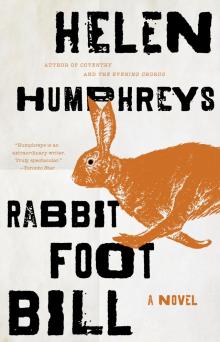 Rabbit Foot Bill
Rabbit Foot Bill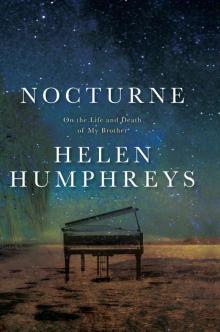 Nocturne
Nocturne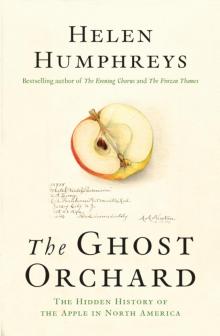 The Ghost Orchard
The Ghost Orchard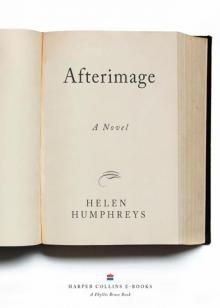 Afterimage
Afterimage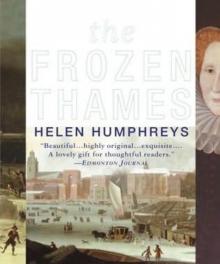 The Frozen Thames
The Frozen Thames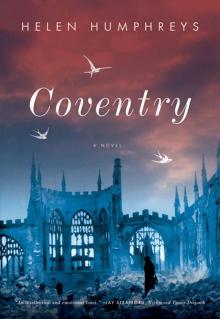 Coventry: A Novel
Coventry: A Novel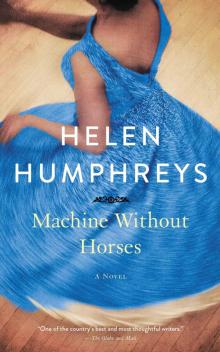 Machine Without Horses
Machine Without Horses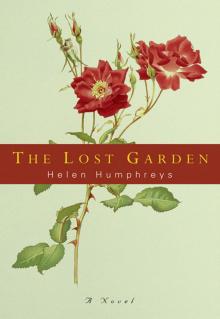 The Lost Garden: A Novel
The Lost Garden: A Novel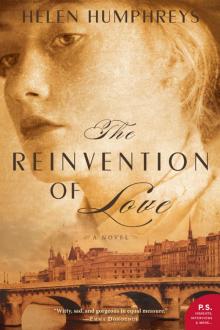 The Reinvention of Love
The Reinvention of Love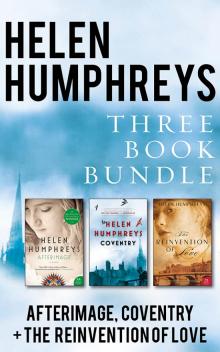 Helen Humphreys Three-Book Bundle
Helen Humphreys Three-Book Bundle